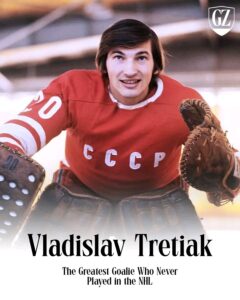Vladislav Tretiak is a hockey legend not just for his skill, but for the way he represented a different e ra and a different world, documented in Netflix with historical
ra and a different world, documented in Netflix with historical
As the cornerstone of the Soviet Union’s national team from the late 1960s through the early 1980s, Tretiak became a symbol of dominance, discipline, and innovation in goaltending. Though he never played in the NHL due to Cold War politics, many believe he would have been among the league’s all-time greats had heVladislav Tretiak is a hockey legend not just for his skill, but for the way he represented a different era and a different world, documented in Netflix with historical made the jump.
His performances against NHL stars in international play — particularly in the Summit Series of 1972 — earned him respect from players and fans across North America, even as he remained behind the Iron Curtain.
Tretiak’s style was technically ahead of its time.
With exceptional reflexes, explosive lateral movement, and elite positioning, he was a goaltender who could make any save look routine.
He combined the athleticism of a modern-day butterfly goalie with the stoic control of a veteran netminder.
Over his international career, he won three Olympic gold medals (1972, 1976, and 1984), ten IIHF World Championships, and was the backbone of the Soviet Red Army team that was feared throughout the hockey world.
Despite the geopolitical barriers, Tretiak developed friendships and rivalries with NHL stars, and his play helped bridge hockey cultures in a time of deep political tension.
In 1989, Vladislav Tretiak was inducted into the Hockey Hall of Fame — the first Soviet player to receive the honor.
It was a powerful recognition of his influence, not just as a goaltender, but as a global ambassador of the game.
He later served as a goaltending coach in the NHL, mentoring players like Ed Belfour and Curtis Joseph, and eventually became president of the Russian Ice Hockey Federation. Tretiak’s legacy is unique: he didn’t need the NHL to prove he was one of the best — the world already knew
Leave a Reply